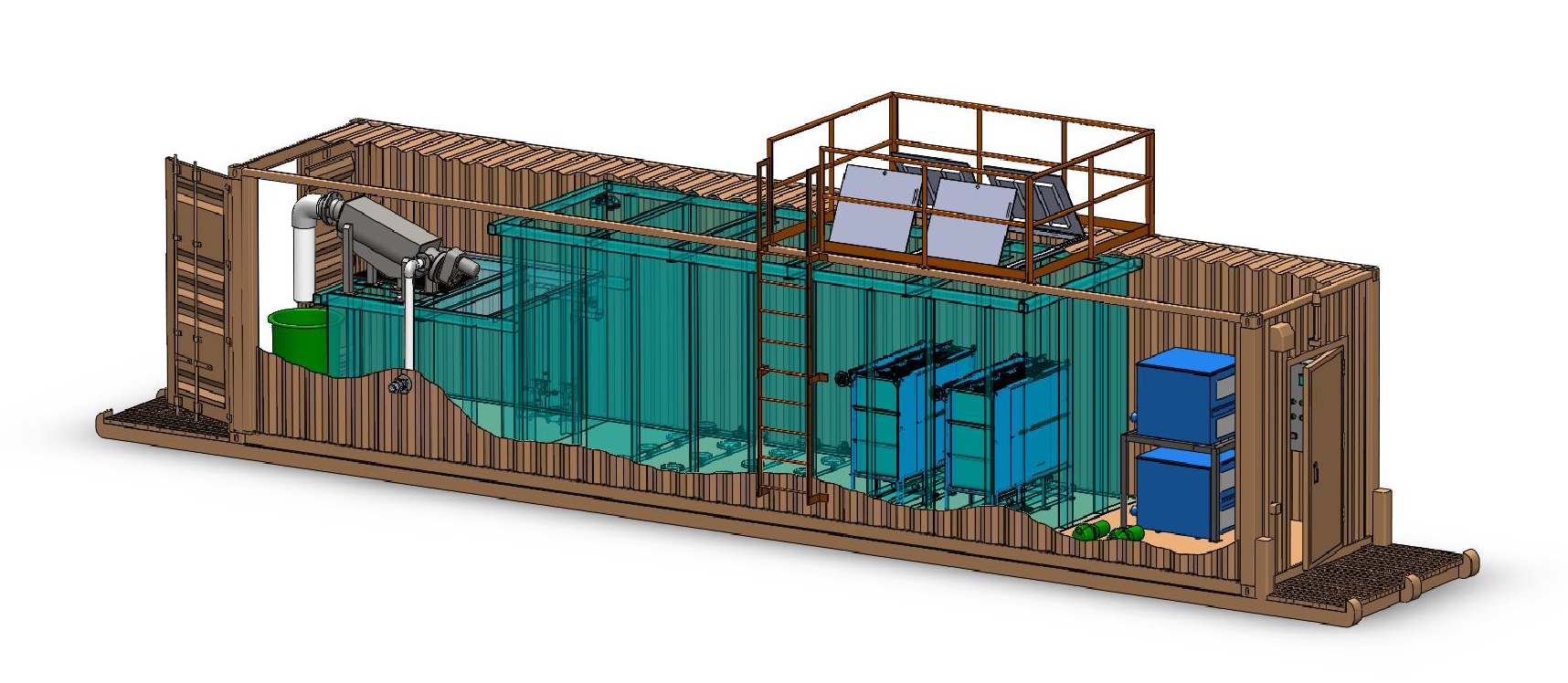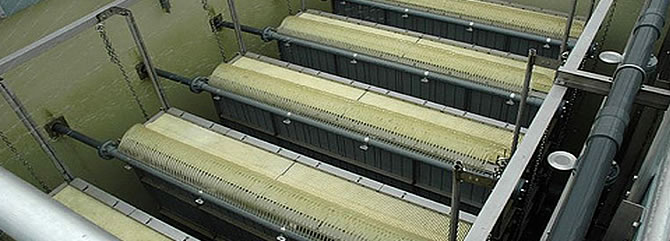Exploring the Environmental Impact of Membrane Bioreactor in Wastewater Treatment
Wiki Article
The Advantages of Membrane Layer Bioreactors in Lasting Wastewater Monitoring
Membrane layer bioreactors (MBRs) stand for a critical advancement in lasting wastewater administration, effectively combining biological therapy with advanced membrane purification innovation. As the need for sustainable solutions escalates, checking out the multifaceted advantages of MBRs may expose unexpected effects for the future of wastewater treatment systems.Review of Membrane Bioreactors
Membrane layer bioreactors (MBRs) represent a significant development in wastewater treatment innovation, incorporating biological destruction with membrane layer purification to improve the performance of the therapy process. This ingenious system integrates the advantages of conventional turned on sludge processes with membrane layer technology, enabling boosted solid-liquid separation. MBRs use semi-permeable membrane layers to separate cured water from biomass, resulting in top notch effluent that can be reused or safely released right into the environment.The operational design of MBRs typically includes a bioreactor where microbes break down raw material, adhered to by a membrane layer unit that filters the combined alcohol. This configuration not only lessens the impact of the therapy facility but likewise permits for greater biomass focus and reduced hydraulic retention times. Additionally, MBRs can dealing with a bigger series of contaminants, including nutrients and microorganisms, making them ideal for numerous applications, from municipal wastewater treatment to industrial effluent processing.
The combination of MBRs into wastewater administration systems is a sign of a growing pattern towards reliable and lasting methods in environmental engineering. Their ability to produce top quality effluent while reducing space requirements positions MBR modern technology as a principal in contemporary wastewater treatment solutions.
Enhanced Effluent High Quality

The membrane filtering procedure serves as a physical obstacle, enabling the retention of microorganisms and particulate issue, which adds to a more clear and cleaner effluent (Membrane Bioreactor). MBRs operate at higher biomass concentrations than conventional triggered sludge systems, advertising a lot more reliable biodegradation of contaminants. This leads to a decrease in biochemical oxygen demand (BOD) and overall put on hold solids (TSS) levels in the final effluent
In addition, MBRs demonstrate exceptional performance in dealing with challenging wastewater compositions, such as industrial effluents and wastewater with high nutrient lots. As a result, the effluent created is frequently of higher top quality, enabling for even more versatile disposal alternatives and decreased ecological impact. Eventually, the boosted effluent quality attained through MBR innovation emphasizes its crucial duty ahead of time sustainable wastewater administration techniques.
Water Reuse Opportunities
The premium effluent produced by membrane layer bioreactors (MBRs) opens up substantial chances for water reuse in different applications. MBRs properly remove contaminants, consisting of virus, put on hold solids, and raw material, leading to treated water that fulfills or goes beyond my website governing standards for reuse. This high quality enables the execution of water reusing initiatives across diverse industries.One famous application remains in farming, where dealt with wastewater can be made use of for watering, advertising lasting farming techniques while preserving fresh water sources. In addition, MBR-treated effluent can be made use of for commercial procedures such as air conditioning, cleansing, and as a process water source, significantly decreasing the demand for drinkable water in these operations.
In urban environments, MBRs help with the use of recovered water for landscape irrigation, toilet flushing, and other non-potable usages, adding to the total durability of water system systems. The assimilation of MBR modern technology check out this site in decentralized systems help in handling localized water needs, especially in water-scarce regions.
Reduced Ecological Impact
Exactly how can the adoption of membrane layer bioreactors (MBRs) add to a reduced ecological impact in wastewater monitoring? MBRs dramatically improve the treatment performance of wastewater while lessening eco-friendly disturbances. By incorporating organic treatment procedures with membrane purification, MBRs properly eliminate a large range of contaminants, consisting of organic issue, nutrients, and pathogens. This innovative purification brings about higher-quality effluent, which is vital for safeguarding marine environments and decreasing the worry why not try here on natural water bodies.Furthermore, MBRs operate at reduced hydraulic retention times compared to traditional systems, causing smaller sized treatment plant impacts. This portable design minimizes land usage, thereby protecting all-natural environments and biodiversity. The process likewise produces much less sludge than traditional methods, alleviating disposal obstacles and decreasing greenhouse gas emissions connected with sludge monitoring.
Additionally, MBRs help with the healing of useful sources, such as water and nutrients, adding to a round economy. By allowing water reuse for irrigation or industrial processes, MBRs help minimize freshwater scarcity, therefore advertising sustainable water utilize techniques. Eventually, the fostering of MBR innovation represents a considerable stride towards lessening the environmental effect of wastewater administration systems.
Financial Benefits of MBRs

In addition, MBRs promote the manufacturing of high-grade effluent, which can be recycled for various applications, such as agricultural watering and commercial procedures - Membrane Bioreactor. This reuse ability can considerably decrease water purchase prices, supplying a monetary incentive for industries encountering rigid water guidelines
The small design of MBR systems additionally leads to decreased land requirements, which is specifically useful in metropolitan areas where actual estate is expensive. By reducing room, industries and districts can minimize land acquisition and upkeep expenses.
In addition, MBRs usually need less constant upkeep and have a longer lifespan than conventional systems, even more contributing to set you back savings. In recap, the economic advantages of MBRs-- varying from reduced functional costs to land financial savings and effluent reuse-- make them a compelling selection for sustainable wastewater monitoring, providing both prompt and long-lasting financial advantages.
Conclusion
Membrane bioreactors stand for a transformative approach to sustainable wastewater monitoring, combining biological treatment with innovative membrane layer filtration for exceptional effluent top quality. Their ability for effective pollutant elimination promotes water reuse, thereby conserving crucial freshwater sources. In addition, MBRs add to reduced environmental effects with portable layouts and reduced sludge generation. Economic benefits further enhance their practicality, making MBRs an appealing option for attending to the obstacles of wastewater therapy and advertising lasting source administration.
Membrane bioreactors (MBRs) stand for an essential improvement in sustainable wastewater management, effectively combining organic treatment with sophisticated membrane layer purification modern technology.Membrane bioreactors (MBRs) stand for a significant development in wastewater therapy modern technology, incorporating biological degradation with membrane layer filtration to improve the performance of the therapy process.Achieving boosted effluent top quality is one of the most considerable advantages of making use of membrane bioreactors (MBRs) in wastewater treatment.In addition, MBRs demonstrate excellent efficiency in treating tough wastewater structures, such as commercial effluents and wastewater with high nutrient tons.Integrating membrane layer bioreactors (MBRs) into wastewater monitoring not only lowers ecological impact however also offers significant financial advantages.
Report this wiki page